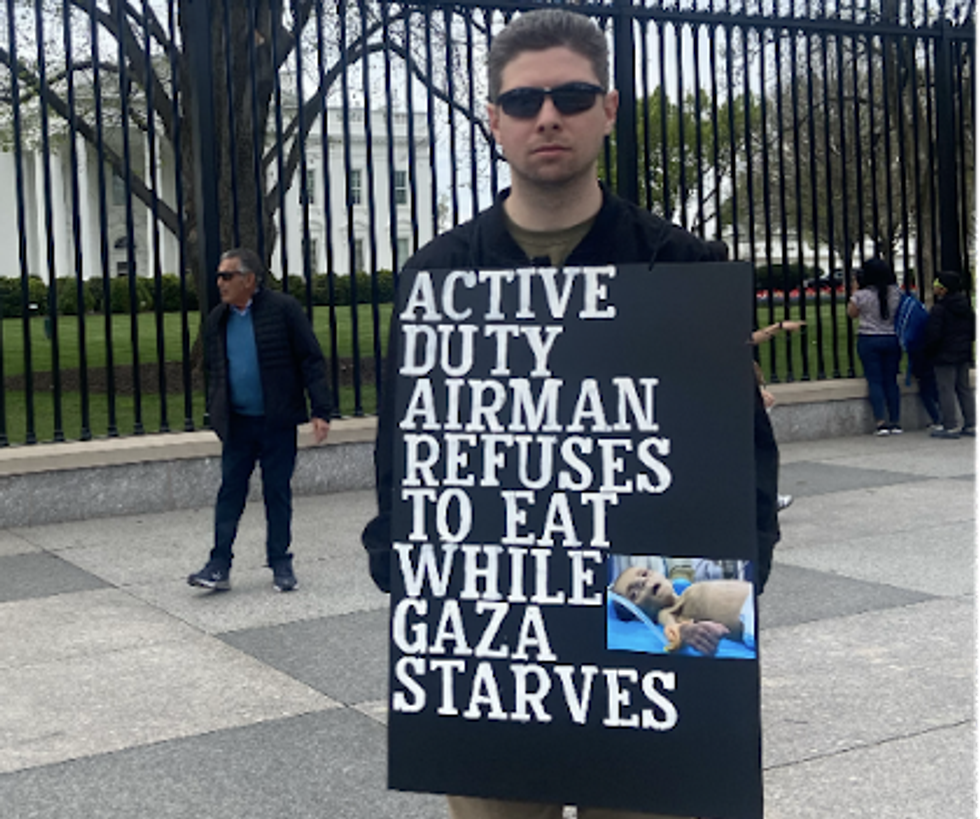Airman Hebert, who recently joined the organization Veterans For Peace, says he was inspired by the self-immolation of active-duty Airman Aaron Bushnell.
"When Aaron Bushnell took his own life at the Israeli Embassy for the people of Gaza, that had a profound impact on me. I felt and resonated exactly with how he was feeling, and so that was really powerful and influential," Hebert said. "But what really infuriated me was the response afterward. Leadership within the military and within our government were just silent. There was utter silence surrounding Aaron Bushnell and what he did."
"We anticipate that other active-duty military and veterans will be following his example."
"I knew I had to raise my voice in opposition to the U.S. government supplying Israel the bombs and rockets to commit genocide in Gaza," said Hebert. "Active-duty members are afraid to speak out, and I hope my example and that of others, like Aaron, can change that."
In mid-March, Hebert, from rural New Hampshire, took an authorized leave from his assignment at Naval Station Rota, Spain. Since then he has participated in demonstrations demanding a permanent cease-fire in Gaza and visited several congressional offices to press for an end to U.S. weapons shipments to Israel, which violate several U.S. laws.
Hebert is standing outside the White House this week with a sign that reads "Active-duty airman refuses to eat while Gaza starves."

He is not wearing a military uniform, which might be considered a violation of military regulations.
"I am on Day 4 of my hunger strike in solidarity with the civilians that are being deliberately starved in Gaza," said Hebert on Wednesday.
Hebert told
Task and Purpose that he currently works as an avionics technician assigned to Naval Station Rota, Spain. The NAVSTA base provides cargo, fuel, and logistics support to military units in the region and supports U.S. and NATO ships with three active piers.
Hebert plans to continue the hunger strike—limiting himself to water and a juice supplement—for as long as he physically can.
He toldMilitary.com, "I don't have a stop or an end for it right now. I'm going to go until my body cannot go any longer or we get the cease-fire and the end of unconditional aid to Israel."
Hebert joins many hundreds of current and retired military and civilian government officials urging U.S. leaders to stop fueling Israel's war that has killed over 32,000 Palestinians, nearly half of whom are children. Starvation and disease are rapidly becoming as deadly as the war itself throughout Gaza, where Israel has bombed hospitals, mosques, and residential neighborhoods to rubble.
"We applaud and wholeheartedly support the courageous action of this young Airman," said Mike Ferner, national director of
Veterans For Peace. "We hope he will inspire other military personnel and veterans to take similar actions."
Veterans For Peace supports military personnel who act in good conscience and refuse to participate in genocide, war crimes, and crimes against humanity, whether directly or in support roles. For example, orders to load or transport U.S. weapons to Israel are illegal, under both U.S. and international law.
Veterans For Peace recommends that military personnel who want more information about their legal rights, or who wish to be discharged from the military, contact the
GI Rights Hotline.
Airman Hebert's protest is gaining national and international notice. On Tuesday alone, he was interviewed by
Democracy Now,The New York Times, The Guardian, Voice of America, Al Jazeera, WMUR-New Hampshire, and The Katie Halpern Show on YouTube.
"Larry Hebert's bold action is having an impact," said Ferner of Veterans For Peace. "We anticipate that other active-duty military and veterans will be following his example."
List of U.S. Laws Violated by the Biden Administration When Sending Arms to Israel
For active-duty members of the U.S. military considering following in Herbert's footsteps, or anyone who seeks more information, here are some of the laws the U.S. is currently breaking. In a February 12 letter to the U.S. State Department inspector-general, Veterans For Peace detailed the U.S. laws currently being violated by U.S. officials every time weapons shipments to Israel are authorized to include:
- The Foreign Assistance Act, which forbids the provision of assistance to a government which "engages in a consistent pattern of gross violations of internationally recognized human rights."
- Arms Export Control Act, which says countries that receive U.S. military aid can only use weapons for legitimate self-defense and internal security. Israel's genocidal campaign in Gaza goes way beyond self-defense and internal security.
- The U.S. War Crimes Act, which forbids grave breaches of the Geneva Conventions, including willful killing, torture, or inhumane treatment; willfully causing great suffering or serious injury to body or health; and unlawful deportation or transfer. All of these crimes are perpetrated daily by the Israeli Occupying Forces.
- The Leahy Law, which prohibits the U.S. government from using funds for assistance to units of foreign security forces when there is credible information implicating that unit in the commission of gross violations of human rights.
- The Genocide Convention Implementation Act, which was enacted to implement U.S. obligations under the Genocide Convention, provides for criminal penalties for individuals who commit or incite others to commit genocide




